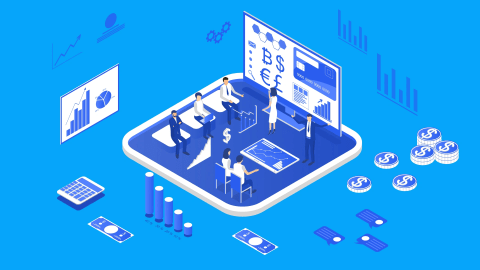Imagine a trading floor where algorithms anticipate market swings before headlines break, compliance reports are generated automatically, and client portfolios are tailored in real-time to shifting global events. This is not a vision of the distant future—Generative AI (GenAI) is making it a reality today. The convergence of GenAI in capital markets and advanced Capital market IT services is reshaping the financial landscape.
Capital markets are entering a bold new era. As data volumes explode and market dynamics become increasingly complex, GenAI is emerging as the ultimate game-changer. Nowadays, top financial institutions are racing to harness this technology, not just to keep up, but to lead. This profound shift underscores the critical role of Capital market IT services in enabling this transformation.
The numbers tell a compelling story:
The competitive edge has shifted: success in capital markets now hinges on the ability to deploy GenAI in capital markets for smarter trading, sharper risk management, and more engaging client experiences. Those who act now are poised to dominate the next decade of financial innovation.
This blog explores what makes GenAI unique, its top use cases in capital markets, the transformative benefits it offers, and a roadmap for firms ready to lead the future.
What Is GenAI and How Does It Differ from Traditional AI?
To truly appreciate GenAI's revolutionary impact, it's essential to understand its core capabilities and how it diverges from traditional AI.
Generative AI refers to sophisticated AI systems that possess the unique ability to create new, original content – be it text, images, code, or synthetic data – rather than simply analyzing, classifying, or predicting based on existing information.
Traditional AI, in contrast, primarily focuses on tasks like pattern recognition, prediction, and the automation of routine, rules-based processes. While invaluable for tasks such as credit scoring or fraud detection based on predefined anomalies, its output is primarily constrained by the data on which it was trained.
GenAI, leveraging cutting-edge deep learning architectures and the best large language models (LLMs), takes this a significant step further. It learns the underlying patterns and structures of vast datasets, enabling it to generate novel content that is statistically similar to its training data but entirely new.
In the context of capital markets, this translates into a monumental shift: moving from static, predictive systems to dynamic, creative AI that can generate sophisticated trading strategies from scratch, automate the drafting of complex compliance reports, and craft highly personalized client communications that resonate on an individual level. These use cases of AI in fintech demonstrate a clear leap forward.
Top 10 GenAI Use Cases in Capital Markets
The applications of GenAI in capital markets are expansive and rapidly evolving, offering transformative potential across the entire value chain.
Here are the top 10 use cases of GenAI in capital markets that are already reshaping the industry, showcasing practical generative AI use cases in finance:

1. AI-Powered Trading Strategies
GenAI in capital markets is fundamentally transforming the trading landscape by moving beyond traditional algorithmic execution. It can generate highly predictive signals, analyze vast streams of real-time market data at unprecedented speed, and rigorously backtest new, complex strategies. Unlike conventional quantitative models that rely on predefined rules, GenAI can synthesize diverse and often unstructured data sources – including global news feeds, social media sentiment, geopolitical developments, and traditional market metrics – to create adaptive trading algorithms.
This capability provides firms with a crucial edge in today's increasingly volatile and interconnected markets. This is a prime example of AI in the securities and trading industry.
- Example:
Leading hedge funds are actively deploying GenAI models to continuously scan global news outlets and social media platforms, discerning shifts in sentiment and identifying emerging trends that could impact asset prices. These AI systems can then instantly adjust portfolio allocations or generate new trade ideas to capitalize on these insights, often far more quickly than human analysts can process the same volume of information. This illustrates the application of generative AI in stock market analysis.
2. Client Acquisition and Hyper-Personalized Engagement
In the competitive world of capital markets, acquiring and retaining clients is paramount. GenAI in capital markets is enabling a new era of highly targeted client acquisition and deeply personalized engagement. AI-driven assistants can analyze vast amounts of client data, including investment history, risk tolerance, communication preferences, and even publicly available demographic information, to deliver hyper-tailored outreach.
This results in the creation of personalized pitches, customized product recommendations, and high-propensity solutions designed to resonate with individual clients, significantly increasing conversion rates and deepening client relationships. These are key use cases of generative AI in the finance industry.
- Example:
Investment banks are leveraging GenAI to create personalized investment proposals and marketing materials. These systems can generate unique narratives, highlight specific product features most relevant to a prospective client's profile, and even draft personalized emails that streamline lead generation and accelerate the client onboarding process. This highlights GenAI in investment banking.
3. AI-Driven Portfolio Construction and Management
For fund managers, GenAI offers sophisticated capabilities for portfolio construction and ongoing management. By processing both structured data (such as financial statements and market prices) and unstructured data (including analyst reports, economic forecasts, and qualitative news), GenAI facilitates advanced data visualization, thematic analysis, and dynamic portfolio optimization.
It can help construct portfolios that are not only aligned with clients' specific financial goals and risk appetites, but also strategically positioned to capitalize on emerging market opportunities. This is a crucial area for GenAI for portfolio management.
- Example:
Asset managers are using GenAI for asset management to identify nascent investment themes – for instance, the rise of specific sustainable technologies or demographic shifts – and then optimize asset allocation across various sectors and geographies. The technology also automates the generation of highly personalized client reports, explaining performance and strategic decisions in clear, concise language.
4. Automated Research Report Generation
The creation of comprehensive financial research reports is a time-consuming and labor-intensive process. GenAI automates the synthesis of economic research by efficiently extracting, summarizing, and generating coherent reports from vast datasets and unstructured information.
This includes analyzing earnings call transcripts, regulatory filings, industry reports, and breaking news. This capability dramatically accelerates research cycles, ensures consistency in analysis, and frees up human analysts for higher-value, strategic thinking. This represents one of the valuable generative AI use cases for finance.
- Example:
Research teams within brokerage firms now leverage GenAI to aggregate and summarize market news, company announcements, and macroeconomic data points. This allows them to produce actionable market commentary and in-depth research reports in minutes, rather than the hours or days it would typically take using traditional methods.
5. Risk Management and Fraud Detection
GenAI in capital markets significantly enhances risk management and fraud detection capabilities by identifying complex patterns and anomalies that might elude human detection or traditional rule-based systems. It can monitor transactions in real time, automate the flagging of suspicious activities, and support regulatory compliance with far greater accuracy and significantly fewer false positives.
Its ability to learn and adapt to new fraud schemes makes it a formidable tool in safeguarding financial systems. This includes advanced AI-powered risk assessment in capital markets.
- Example:
Broker-dealers utilize GenAI to monitor trading activity across millions of transactions, identifying subtle deviations that could indicate market manipulation, insider trading, or money laundering. These systems can flag potential fraud and financial crime risks before they escalate, enabling swift intervention and mitigating both financial and reputational damage.
6. Regulatory Compliance and Reporting Automation
Compliance is a perpetual and often overwhelming cost center within capital markets, characterized by complex, ever-evolving regulations. GenAI automates the creation of regulatory filings, continuously monitors compliance requirements across multiple jurisdictions (including the intricate regulatory landscapes of the US and Canada), and ensures accurate, timely reporting.
This drastically reduces manual workload, minimizes the potential for human error, and helps firms navigate the labyrinthine world of financial regulation with greater confidence. This illustrates powerful GenAI use cases in the banking industry.
- Example:
Clearinghouses and large financial institutions are deploying GenAI to generate and validate complex regulatory reports, such as those required by FINRA, SEC, or OSFI. This streamlines audit processes, reduces compliance risk, and ensures adherence to stringent reporting deadlines. This is vital AI in finance use cases.
7. Middle- and Back-Office Operations Automation
The efficiency of middle- and back-office operations is crucial for the seamless functioning of any capital markets firm. GenAI streamlines these labor-intensive functions by automating tasks such as document processing, trade reconciliation, and settlement procedures.
This directly translates into reduced operational costs, a significant decrease in errors, and accelerated post-trade workflows, allowing firms to handle greater transaction volumes with existing resources. This is a clear example of capital markets AI solutions at work.
- Example:
Operations teams are increasingly using GenAI to extract and validate trade data from various disparate systems and formats, ensuring consistency and accuracy across the entire trade lifecycle. This leads to faster settlements, fewer discrepancies, and ultimately, improved operational efficiency.
8. Synthetic Data Generation for Stress Testing and Model Validation
Access to vast, high-quality, and diverse datasets is critical for robust stress testing, scenario analysis, and the validation of complex financial models. GenAI excels at creating synthetic datasets that accurately mimic the statistical properties of real-world financial data without exposing sensitive client or proprietary information.
This capability is invaluable for developing and refining models, conducting comprehensive "what-if" analyses, and enhancing the reliability and resilience of risk models under various market conditions. This is a practical application of generative AI in financial modeling.
- Example:
Major banks are leveraging GenAI to generate synthetic loan portfolios or market scenarios, enabling them to conduct exhaustive stress tests that meet stringent regulatory standards, particularly concerning capital adequacy and liquidity. This allows for thorough model validation without compromising data privacy.
9. Digital Advisor Assistants and Relationship Management
GenAI is democratizing access to sophisticated financial advice and enhancing client relationships. GenAI-powered digital advisors can analyze individual client portfolios, provide real-time investment guidance, and proactively identify opportunities for cross-selling or upselling.
These intelligent assistants can interact with clients in their natural language, offer personalized insights, and significantly improve overall client satisfaction and retention by providing readily accessible, tailored support. This highlights the various use cases of generative AI in the financial services sector.
- Example:
Wealth managers are implementing GenAI assistants that analyze a client's financial goals and risk profile to deliver personalized investment advice, offer market updates, and alert clients to relevant investment opportunities or potential portfolio rebalancing needs, effectively augmenting the human advisor's capacity. This shows how generative AI is used in finance.
10. Employee Productivity and Knowledge Management
Beyond client-facing and operational applications, GenAI significantly boosts internal employee productivity and knowledge management. By automating tasks such as summarizing extensive research documents, facilitating natural language queries for internal databases, and supporting comprehensive employee enablement programs, AI-driven tools help staff quickly access relevant information.
This leads to improved decision-making, enhanced collaboration, and greater overall operational efficiency across the firm. These are critical top GenAI applications in capital markets.
- Example:
Capital markets firms are deploying GenAI solutions to summarize internal research papers, streamline onboarding processes for new hires, and support continuous compliance training by generating tailored learning modules and answering policy-related questions, making knowledge instantly accessible and actionable. This demonstrates effective AI use cases in the finance sector.
These diverse use cases highlight GenAI's potential to drive significant efficiencies, enhance decision-making, and unlock new opportunities across capital markets. As technology continues to mature, we can expect even more transformative use cases to emerge, reshaping the future of finance.
Benefits of GenAI for Capital Market Players
GenAI delivers substantial and multifaceted value across the entire capital markets ecosystem, yielding a decisive competitive advantage:

- Speed: GenAI dramatically accelerates critical processes, from rapid trade execution and real-time reporting to expedited client onboarding and lightning-fast analysis of market shifts. This speed is crucial in fast-moving financial markets.
- Efficiency: By automating a wide array of manual, repetitive, and often error-prone tasks, GenAI significantly reduces operational costs, minimizes human errors, and frees up valuable human capital to focus on more strategic initiatives.
- Personalization: GenAI enables an unprecedented level of hyper-targeted client engagement, allowing for individualized investment proposals, tailored communications, and bespoke portfolio management, leading to enhanced client satisfaction and loyalty.
- Compliance: The technology significantly enhances regulatory accuracy and consistency, streamlines reporting, and proactively identifies potential compliance breaches, thereby reducing audit risk and potential penalties.
- Innovation: GenAI acts as a catalyst for innovation, unlocking entirely new revenue streams, fostering the development of novel financial products, and enabling the creation of advanced business models that were previously unimaginable. This highlights the benefits of Generative AI for business.
- Scalability: GenAI-powered solutions are inherently scalable, capable of handling rapidly increasing data volumes and transaction flows. This flexibility enables rapid growth, allowing firms to adapt to dynamic market changes and evolving client demands quickly.
The Impact of Generative AI on Capital Markets
Benefit | Impact on Capital Markets |
Speed | Faster execution, reporting, and onboarding; real-time insights |
Efficiency | Lower costs, fewer manual errors, optimized resource allocation |
Personalization | Higher client satisfaction and retention, bespoke client experiences |
Compliance | Improved regulatory adherence, fewer penalties, and proactive risk mitigation |
Innovation | New products, services, and business models; competitive differentiation |
Scalability | Agile response to market changes and growth; increased capacity |
Challenges, Risks, and Ethical Considerations
Despite its immense promise, the widespread adoption of GenAI financial services presents several challenges and inherent risks. Prudent firms must address these considerations proactively:
- Bias: GenAI models are trained on vast datasets, and if these datasets contain inherent biases – whether historical, societal, or data collection biases – building the AI models may inadvertently perpetuate or even amplify these biases in their outputs, thereby impacting fairness in areas such as credit assessment or client profiling.
- Explainability (Lack of Transparency): Many advanced GenAI models, particularly complex neural networks, can operate as "black boxes," making it challenging to understand precisely how they arrive at a particular decision or generate specific content. This lack of explainability can complicate regulatory compliance, hinder internal auditing, and erode client trust, especially when critical financial decisions are involved.
- Data Security and Privacy: Handling sensitive financial data and confidential client information with GenAI systems requires extraordinarily robust privacy and cybersecurity protocols. The risk of data leakage, unauthorized access, or misuse of generated content is a significant concern that demands stringent data governance.
- Regulatory Uncertainty: The regulatory landscape surrounding AI, particularly GenAI, is still in its early stages, both in the US and Canada. Evolving rules and guidelines demand constant vigilance and adaptability from financial institutions to ensure ongoing compliance.
- Human Oversight: While GenAI automates and augments, it does not replace human judgment. Ensuring that appropriate human-in-the-loop controls are in place for critical decisions, particularly those that impact client outcomes or market stability, is essential to mitigate risks and maintain accountability.
Best Practices:
- Regularly audit AI models for potential biases, fairness, and performance degradation.
- Invest in explainable AI (XAI) techniques and strive for greater transparency in model outputs.
- Implement strict data governance frameworks and cutting-edge cybersecurity measures to protect sensitive information throughout the GenAI lifecycle.
- Proactively engage with regulatory bodies and stay current with AI regulations.
- Design workflows that incorporate human oversight and validation for AI-generated recommendations and content, especially in high-stakes scenarios.
Steps to Implement GenAI in Your Capital Market Firm
Embarking on the GenAI journey requires a strategic and methodical approach. Here’s a roadmap for capital market firms looking to leverage GenAI in capital markets successfully:

- Assess AI Readiness: Begin by conducting a thorough internal assessment of your existing data infrastructure, technological capabilities, and strategic business goals. Identify where GenAI can deliver the most significant impact, and pinpoint key generative AI use cases finance.
- Develop a Robust Data Strategy: GenAI thrives on high-quality, relevant, and diverse data. Secure access to clean, well-governed datasets, and establish a data pipeline that can feed your AI models effectively. Consider internal data lakes and external market data sources for these capital markets AI solutions.
- Identify High-Impact Use Cases: Prioritize areas where GenAI can deliver a clear, measurable return on investment (ROI). Focus on immediate pain points or areas with significant potential for competitive advantage, such as optimizing trading, compliance, or client engagement. These are key use cases of GenAI in capital markets.
- Launch Focused Pilot Programs: Begin with small, well-defined pilot projects. This allows you to test the effectiveness of GenAI solutions in a controlled environment, measure tangible outcomes, and iterate based on real-world feedback before scaling.
- Build Cross-Functional Teams: Successful GenAI implementation requires collaboration. Assemble diverse teams comprising business leaders, technology experts, data scientists, compliance officers, and legal counsel to ensure a holistic approach.
- Ensure Regulatory Compliance: Proactively engage with legal and compliance teams. Stay informed about the evolving AI regulations in your operating jurisdictions to ensure all GenAI initiatives comply with current and anticipated legal frameworks. This is crucial for the use of Gen AI in banking.
- Scale and Integrate Strategically: Once pilots demonstrate success, develop a plan to scale these solutions across the enterprise. Seamlessly integrate GenAI capabilities with existing workflows and systems to maximize efficiency and adoption.
The Horizon: Emerging GenAI Trends in Capital Markets
The trajectory of GenAI in capital markets is one of accelerating innovation and deeper integration. The next wave of adoption will focus on:

- Enterprise-Wide Adoption: Moving beyond isolated pilot programs to scalable, integrated GenAI solutions that permeate every facet of a financial institution's operations, transforming core business processes.
- Generative Co-pilots: The proliferation of intelligent AI assistants that act as "co-pilots" for traders, bankers, and analysts, providing real-time insights, automating routine tasks, and augmenting human capabilities. This is another facet of how generative AI is used in finance.
- Predictive Intelligence Reinvented: Combining GenAI with advanced predictive analytics to move beyond reactive responses. This will enable proactive identification of emerging risks, hidden opportunities, and shifts in market dynamics, leading to more resilient strategies.
- Geo-Targeted Compliance: GenAI will become indispensable for navigating the increasingly complex and often divergent regulatory landscapes, particularly concerning specific requirements in the US and Canadian markets, offering GenAI-powered solutions for hyper-localized compliance.
- Tokenization and Digital Assets: GenAI will play a pivotal role in the burgeoning world of digital assets and tokenized securities, assisting in their creation, intelligent management, real-time valuation, and compliance with evolving regulatory frameworks. This includes generating smart contract code, analyzing blockchain data, and facilitating secure transactions of digital assets.
Choose VLink Capital Markets Expertise for Your Brand
In the rapidly evolving landscape of capital markets, where innovation is no longer a luxury but a necessity, selecting the right technology partner can be the singular determinant of success.
VLink stands at the forefront of this transformation, offering not just solutions but a profound partnership built on deep industry expertise and a proven track record in delivering cutting-edge AI and digital transformation.
We don't just understand technology; we understand the intricacies of capital markets, enabling your firm to navigate disruption and emerge as a leader. Our financial software development services are designed to meet your precise needs.
Why Partner with VLink for Your GenAI Journey?
Our commitment to empowering financial institutions goes beyond mere software deployment. We offer:
- Capital Markets Acumen: Our dedicated team has a comprehensive understanding of the full spectrum of capital markets, spanning investment banking compliance. This ensures your GenAI in capital markets implementation is precisely tailored for the US and Canadian markets, covering vital generative AI use cases in finance and supporting Generative AI in finance and accounting.
- End-to-End Solutions: VLink provides comprehensive services, guiding your AI journey from strategic consulting and robust development to seamless integration and ongoing support. Our custom software development services are designed to integrate GenAI financial services effectively, maximizing efficiency.
- Measurable ROI & Growth: We focus on high-impact generative AI use cases in finance that deliver clear, measurable returns. Our approach ensures that your GenAI solutions consistently contribute to revenue growth, cost reduction, and a sustained competitive edge, demonstrating the benefits of Generative AI for business.
- Ethical AI & Robust Security: In finance, trust is paramount. VLink champions ethical AI development services with stringent cybersecurity and data governance, ensuring the protection of sensitive financial data and compliance. This commitment extends to our Generative AI in banking solutions.
- Agility & Future-Proofing: VLink uses agile methodologies for rapid development and adaptation. We design scalable, flexible GenAI architectures that evolve with market changes, securing your investment and making our expertise a practical Generative AI for finance course in real-world applications.
By choosing VLink, you're securing a strategic partner committed to unlocking unprecedented value for your brand, driving innovation, and solidifying your position at the pinnacle of the capital market industries.
Wrap Up!
GenAI in capital markets is no longer just a technological advantage; it's a fundamental shift, a strategic imperative that's redefining the very fabric of the financial industry. From unlocking unprecedented efficiency in AI-powered trading and AI in securities and trading to ensuring robust, automated compliance, Generative AI is empowering firms to gain a decisive, sustainable edge. The myriad use cases of GenAI in capital markets clearly demonstrate its transformative power across every function.
The future of finance belongs to those who don't just observe but actively embrace AI-driven innovation. By integrating cutting-edge capital market IT services with the vast potential of GenAI, firms can unlock new levels of performance, deliver superior client experiences, and navigate an increasingly complex global financial landscape with confidence. Don't be left behind in this critical evolution.
Ready to transform your capital markets business with Generative AI? Connect with VLink's experts today to explore tailored solutions and revolutionize your operations.










 Shivisha Patel
Shivisha Patel

















